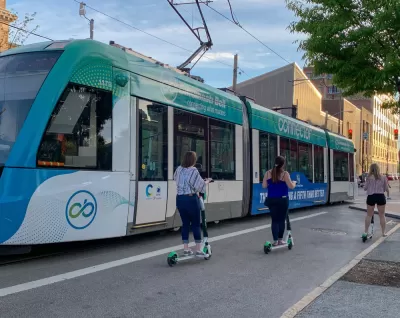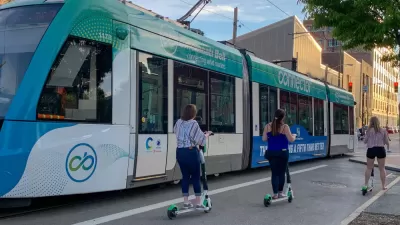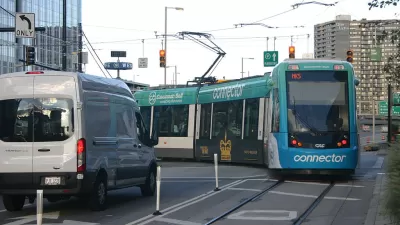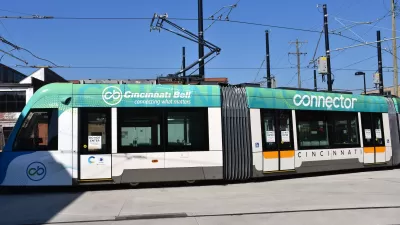The Cincinnati Bell Connector has been offering free rides since reopening in October, but the Cincinnati City Council recently decided to make the free rides a permanent feature.

"Since reopening after a pandemic-related suspension, Cincinnati's streetcar has not charged fares for passengers to ride. Starting [November 1], that change will become permanent," reports Pat LaFleur.
The free ride rely on a fare-free operations structure first implemented as a 60-day measure in September, according to LaFleur. In addition to the benefits of free rides, streetcar riders are also expected to benefit from improved service performance, as the time for paying fare has been removed from the boarding equation.
"Given the pandemic-related, months-long streetcar shutdown, and now having operated fare-free for the last two months, recent data regarding how much fare revenue the streetcar collected on a daily basis is scarce and unreliable," writes LaFleur. "In a May 2019 memo, then-City Manager Patrick Duhaney estimated that the Connector had brought in roughly $330,000 in fares in 2018, but the cost to collect those fares -- including printing the tickets, maintaining the ticket vending machines and paying fare inspectors -- offset that revenue by nearly $260,000."
The article also includes details of Mayor John Cranley's counter proposal, which failed to gain the political traction over the fare-free idea.
FULL STORY: Cincinnati streetcar will go fare-free permanently starting Nov. 1

Planetizen Federal Action Tracker
A weekly monitor of how Trump’s orders and actions are impacting planners and planning in America.

Congressman Proposes Bill to Rename DC Metro “Trump Train”
The Make Autorail Great Again Act would withhold federal funding to the system until the Washington Metropolitan Area Transit Authority (WMATA), rebrands as the Washington Metropolitan Authority for Greater Access (WMAGA).

DARTSpace Platform Streamlines Dallas TOD Application Process
The Dallas transit agency hopes a shorter permitting timeline will boost transit-oriented development around rail stations.

New Alaska Bitcoin Mine Would Burn as Much Energy as the State’s Largest Coal Plant
Fueled by “stranded” natural gas, the startup hopes to become the largest in the US, and to make Alaska an industry center.

New Jersey Duplexes Elicit Mixed Reactions
Modern, two-unit residences are proliferating in northern New Jersey communities, signaling for some a boon to the housing supply and to others a loss of historic architecture.

Renters Now Outnumber Homeowners in Over 200 US Suburbs
High housing costs in city centers and the new-found flexibility offered by remote work are pushing more renters to suburban areas.
Urban Design for Planners 1: Software Tools
This six-course series explores essential urban design concepts using open source software and equips planners with the tools they need to participate fully in the urban design process.
Planning for Universal Design
Learn the tools for implementing Universal Design in planning regulations.
Municipality of Princeton
Roanoke Valley-Alleghany Regional Commission
City of Mt Shasta
City of Camden Redevelopment Agency
City of Astoria
Transportation Research & Education Center (TREC) at Portland State University
US High Speed Rail Association
City of Camden Redevelopment Agency
Municipality of Princeton (NJ)





























